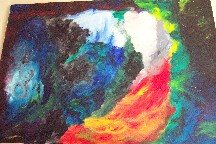Trying to Sort Through the Semantics

How come we aren't supposed to say "colored people" when it's the National Association for the Advancement of Colored People? I'm not looking to use the phrase - it makes me flinch the same as many Americans - I'm just trying to figure out the meanings of the words we use.
But if they changed the name of the NAACP, wouldn't the new term be out-dated and un-PC in a decade or two anyway?
Why are we not supposed to call black people black when it's okay to call white people white? Black people are never actually black and white people (except, I suppose, in the case of albinos) are never actually white, but it's an easy and clear way of talking about skin color. Black at one end, white on the other and a whole bunch of people who fall in between. Everyone will know what you mean if you use those words. What is wrong with that?
I'm all for being called whatever you want to be called, but I just want some consistancy. Changing the words we use to describe race and race relations does not make those who are shit on any better off nor does it change the attitudes of those who do the shitting.
[I had another paragraph here about my uncle being the only white kid in Hicksville, Florida to join the black kids in lowering the flag to half mast when MLK, Jr. was killed, and about how even white people like him who fought on the front lines of the civil rights war have to be careful about the words they use and jokes they tell for fear of being labeled "racist", but I have chosen to remove it because my wording of these ideas really might offend. If I was black I could have left it in. Which was my point in the first place.]

3 Comments:
"White" people are never really white. I have seen some "black" people who are very dark, and there are varying degrees of "black". For the most part they are different shades of brown. If you say "brown" people then one might think of the native american indian. Then there is the "yellow" race which includes all of asia. I usually go by nationality or just give a name and let people figure it out. I am of italian descent and I say I have olive skin. Olives are of different colors, but I have more green to my skin tone. I think we are too focused on color. More specifically, we are a society focused on catagories. When we speak of a person or group of people we feel a need to note their race, religion, lifestyle, profession or by some other catagory as a sort of qualifier. It is as if someone needs visual. For example, if they are of a certain faith they must look or behave a certain way. When someone says that a person is colored I am tempted to ask "what color?". I learned in my real estate training that everyone is the same color, "green".
We do love categories. The question is: is categorization a Western cultural phenomenon due to our love of science or is it a universal human trait? Are different types of categorization found to different degrees around the world?
If our love of categories is universal, I would want to say it has to do with the development of language and the need to name things to talk about them.
Margaret Cho has a great bit about how because she's asian people expect her to know what nationality all other asians are. beep beep beep...Philipino. beep beep beep...Japanese.
Re-reading my comment above, I just realized that I was trying to categorize the use of categorization.
See? Just can't get away from it. When we want to understand, we need to define what it is we're understanding.
It's like an image within an image within an image: the problem of categorization never goes away.
Post a Comment
<< Home